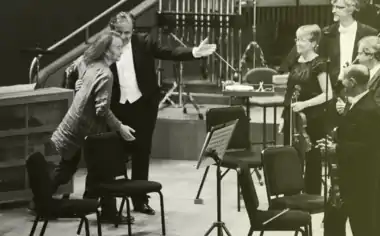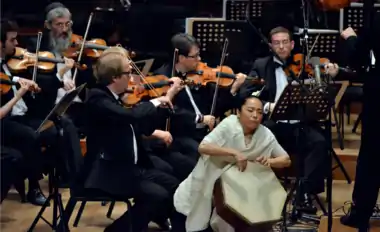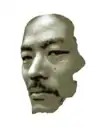He Xuntian
He Xuntian (simplified Chinese: 何 训 田; traditional Chinese: 何 訓 田; pinyin: Hé Xùntián; born in 1952 in Suining, Sichuan) is a composer and professor of music composition at the Shanghai Conservatory of Music.[1][2]

Biography

In 1982, he graduated from the Composition Department of the Sichuan Conservatory of Music.
In 1981, he established Three Periods Theory and Theory of Musical Dimension;
In 1982, he developed RD Composition (renyilu duiyingfa Composition), the first compositional method of contemporary China;
In 1993, he established the Five Nons (Non-Western, non-Eastern, non-academic, non-folk, and non-non.) ;
In 1995, Sister Drum was launched, making him the first Chinese composer to have his record released worldwide. This album, together with a number of others including Voices from the Sky, was released in more than 80 countries with a total sales volume of several million copies;
In 1996, he established SS Composition (stream of structure Composition);
In 1997, he put forward Theory of Interspace;
In 1998, he became director of the Composition & Conducting Department at Shanghai Conservatory of Music.
In 2003, he composed Images in Sound, which was humanity's first gift of primordial music to all species of the natural world;
In 2008, he produced Ehe Chant, the first work of Preconsciousness Music in human history.[3][4]
He has received 15 international composition awards, including the Outstanding Musical Achievement Award of the International New Music Composer Competition USA 1989–1990; 13 national composition awards, including the First Prize at the Third All-China Music Competition.[3]
His works have been published globally by a number of international publishing companies, including Warner Music Group and Schott Music; and premiered and performed worldwide by many leading orchestras and ensembles, including BBC Scottish Symphony Orchestra and The Israel Symphony Orchestra.[5][6][7]
He is known for his compositions done for Dadawa, whose breakthrough was Sister Drum – an international bestseller that sold more than 2 million copies. He has been collecting Tibetan music for twenty years and this has heavily influenced his compositions.
Awards
- International New Music Composer Competition – The Outstanding Musical Achievement Award in USA (1989–1990)
- The Gold Tripod Award in Taiwan (1995)
Major works
Theory
Poems
|
He Xuntian: Passing By the Earth, 1999
|
- Believer 信徒 (1993)
- Paradise Inferno 天堂地狱 (1993)
- Himalayans 喜玛拉雅人 (1995)
- Ballad of Lhasa 拉萨谣 (1995)
- Seven Drums 七只鼓 (1995)
- Ox Cart 牛车 (1997)
- Flown Away 不翼而飞 (1997)
- Flash of Enlightenment 三托历 (1997)
- In the Setting of the Sun 夕阳西下 (1997)
- Already Song 了歌 (1998)
- Fragrant Nirvana Tree 伽南香娑罗树 (1999)
- Passing By the Earth 路过地球 (1999)
- Mystical Scent 神香 (2006)
Chinese orchestra
- Dabo River Caprice, Chinese orchestra 达勃河随想曲 (1982)[11]
Chamber music
- Two of the Earthly Branches, string quartet 两个时辰 (1983)
- Phonism I, 10 performers 幻听 I (1989)
- Phonism II, 9 performers 幻听 II (1990)
- FuSe Pattern (trio), 3 performers 拂色图 (1997)
- Scent Dance I, clarinet solo 香之舞 I (2009)
- Scent Dance II, violoncello solo 香之舞 II (2010)
- Scent Dance III, string quartet 香之舞 III (2011)[12]
- Whirling Udumbara II (trio), viola, violoncello and he-drum 优昙波罗旋转舞 II (2012)[3]
- Whirling Peach Blossom, violin, viola and he-drum 桃花旋转舞 (2015)
Piano music
- FuSe Pattern 拂色图 (1997)
- Rupa Dance, piano concerto 色之舞 (2009)[13]
- Scent Dance IV 香之舞 IV (2012)
- Whirling Udumbara II 优昙波罗旋转舞 II (2012)
- Whirling Udumbara I 优昙波罗旋转舞 I (2013)
- Whirling Papaver 米囊旋转舞 (2014)
- Whirling Peach Blossom 桃花旋转舞 (2015)
- Cherry Prayer 樱桃祈祷文 (2015)
- Kalavinka Sutra 迦陵频伽经文 (2016)
- Priceless Wealth Is in Thee 无价之宝在你那 (2017)
Orchestral music

- Tonal Patterns, symphony 平仄 (1985)[14]
- Four Dreams, electric erhu and orchestra 梦四则 (1986)[15]
- Telepathy, symphony 感应 (1987)
- Pipa Pattern, string orchestra and woodwind 琵琶图 (2001)[13]
- Clouds Rising Into the Lotus Flowers, soprano and orchestra 云上莲花 (2008)[13]
- Rupa Dance, piano concerto 色之舞 (2009)[13]
- Sunyata Dance, clarinet concerto 空之舞 (2011)[13]
- Whirling Udumbara II, string orchestra and he-drum 优昙波罗旋转舞 II (2012)[13]
Unconventional Instruments
- Sounds of Nature, unconventional Instruments, seven performers 天籁 (1986)[16][17]
- Images in Sound, unconventional Instruments 声音图案 (1997–2003)
- MiLi Pattern 秘厘图
- FuSe Pattern 拂色图
- MiYi Pattern 弥泆图
- FuXiang Pattern 浮香图
- MiGuo Pattern 密果图
- FuYi Pattern 弗意图
- MiFu Pattern 靡符图
Preconsciousness music
- Ehe Chant, preconsciousness music 一訸上歌 (2008)[4]
Film music
Multimedia music
- The Riddler, musical theatre 迷哥 (2001)
- Leifeng Pagoda Music Ceremony 雷峰夕照音乐大典 (2002)[19]
- The Sign, Internet game music 神迹 (2003)
- Eulogy of Lingshan Lucky, music ceremony 灵山吉祥颂 (2009)[20][21]
- Forever Shanghai, the Shanghai Pavilion at Expo 2010 Shanghai 永远的新天地 (2010)
Discography
.jpg.webp)
The manuscript was written by He Xuntian (1999)
- Yellow Children 黄孩子 (1991)[22]
- 《大海走了》The Sea is Gone
- 《黄孩子》Yellow Children
- 《吹箫人》The Xiao Player
- 《不相识的父亲》The Unknown Father
- 《缘》The Fate
- 《枯水季节》The Dry Season
- 《这才是你》This is You
- 《远去的孩子》The Child Going Far Away
- Sister Drum 阿姐鼓 (1995)[23]
- 《没有阴影的家园》Home without Shadow
- 《阿姐鼓》Sister Drum
- 《天唱》Sky-Burial
- 《笛威辛亢 纽威辛亢》Di Wei Shin Kan, New Wei Shin Kan (《天堂地狱》Paradise Inferno)
- 《羚羊过山岗》Crossing the Ridge
- 《卓玛的卓玛》Zhuoma of Zhuomas
- 《转经》The Turning Scripture
- Warrior Lanling 兰陵王 (1995)
- 《远古的回声》Ancient Echo
- 《美丽的鳯雀部落》Beautiful Phoenix Tribe
- 《生殖舞》Dance of Reproduction
- 《兰陵与面具》Lanling and Mask
- 《黑发舞》Dance of Black Hair
- 《神树》Divine Tree
- 《血祭》Blood Sacrifice
- 《母亲的歌》Mother's Song
- Voices from the Sky 央金玛 (1997)[24]
- 《央金玛》Melodious Goddess
- 《拉萨谣》Ballad of Lhasa
- 《信徒》Believer
- 《七只鼓》Seven Drums
- 《喜玛拉雅人》Himalayans
- 《六世达赖喇嘛情歌》The Sixth Dalai Lama's Love Song
- 《彼岸之问》Question from the Other Shore
- Paramita 波罗密多 (2002)[25]
- 《云钟》Cloud Bells
- 《波罗密多》Paramita
- 《阿耨多罗三藐三菩提》Song of the Enlightenment
- 《琵琶行》Song of Pipa
- 《群僧》Monks
- 《般若心经》Heart Sutra
- 《尘鼓》Earth Drums
- 《白蛇舞》Dance of the White Snake
- 《春歌》Spring Song
- 《千江月》Moons upon a Thousand River
- The Sigh 神迹 (2003)[26]
- 《鹰》The Eagle
- 《迹》The Sign
- 《九天乐》Ecstasy with Ninth Heaven
- 《荒漠》Desert
- 《孤岛》Isolated Island
- 《十地火境》Fire in Dasa-bhumi
- 《十地水境》Water in Dasa-bhumi
- 《十地魔境》Magic in Dasa-bhumi
- 《王者夺鼎战》The Battle
- Seven Days 七日谈 (2006)[27]
- 《不翼而飞》Flown Away
- 《伽南香娑罗树》Fragrant Nirvana Tree
- 《夕阳西下》In the Setting of the Sun
- 《了歌》Already Song
- 《三托历》Satori (《无归的路》)
- 《路过地球》Passing By the Earth
- 《第七天》The Seventh Day
- Mystical Scent 神香 (2007)[28]
- 《盛典》Sacred Book
- 《命运之子》Son of Destiny
- 《神香》Mystical Scent
- 《狼婆湖》Wolf-Woman Lake
- 《藏戏舞》Tibetan Drama Dance
- 《恋人》Lover
- 《山歌》Mountain Song
- 《神香》Mystical Scent
- 《征途》Journey
- 《最后的眼泪》The Last Tear
- 《神香》Mystical Scent
- Images in Sound 声音图案 (2007)
- 《秘厘图》MiLi Pattern
- 《拂色图》FuSe Pattern
- 《弥泆图》MiYi Pattern
- 《浮香图》FuXiang Pattern
- 《密果图》MiGuo Pattern
- 《弗意图》FuYi Pattern
- 《靡符图》MiFu Pattern
- Tathagata 如來如去 (2009)[29]
- 《天外天》The Heaven Outside of Heaven
- 《达塔伽达》Tathagata
- 《冥思》Meditation
- 《虚空之心》The Heart of the Void
- 《色界》The Realm of Forms
- 《树有风》The Wind the Trees
- 《四方之舞》The Dance of the Four Dharmadhatus
- 《如来如去》Tathagata
- Ehe Chant 一訸上歌 (2012)[30]
- 《一訸上歌》Ehe Chant
References
- "He Xuntian". Musical Works. August 8, 2013. pp. 1–21. ISSN 0513-2436.
- "Cover of People's Music , 2001–06". People's Music. June 12, 2001.
- "He Xuntian". Schott Music. June 2012.
- "Ehe Chant 832". Life. April 2012.
- "He Xuntian go hand in hand with The Israel Symphony Orchestra". eastday. Archived from the original on April 2, 2015. Retrieved September 19, 2014.
- "He Xuntian of "Pan-Exotic"". Chinese Business News. Retrieved December 8, 2014.
- "The Music Is Etched on the Memory of All Generation". People's Daily. Retrieved February 10, 2015.
- "Thus have I heard He Xuntian". Musical Works. August 8, 2013. pp. 22–27. ISSN 0513-2436.
- "The Compositional Concept and Theory of He Xuntian". Dissertation of Shanghai Conservatory of Music. January 2011.
- "He Xuntian's Ark". People's Music. January 12, 2005. pp. 28–31. ISSN 0447-6573.
- "Analysis of Dabo River Caprice". Dissertation of Sichuan Conservatory of Music. March 1984.
- "Scent Dance III". Schott Music. July 2013.
- "Scent Dance: Extraordinary Fragrance". Arts Criticism. February 4, 2015. pp. 84–87. ISSN 1672-6243.
- "Telepathy: He Xuntian Symphony Works Concert". People's Music. February 12, 1989.
- "Analysis of Four Dreams Composed by He Xuntian". Dissertation of Shanghai Conservatory of Music. February 2009.
- "Sounds of Nature: He Xuntian's RD Composition". Explorations In Music. January 1989.
- "Impressions of Sounds of Nature". Music Lover. March 1987.
- "Warrior Lanling". china daily. Retrieved March 15, 2006.
- "Singing From Heaven". hangzhou.com.cn. Archived from the original on February 27, 2003. Retrieved October 23, 2002.
- "Vocals are common to all mankind: Interview Xuntian He". Southern Weekly. Archived from the original on March 31, 2014. Retrieved April 8, 2009.
- "Touched sentient beings: He Xuntian's Ode to Good Fortune". music weekly. Retrieved April 28, 2009.
- "Analysis of He Xuntian". Dissertation of Shanghai Conservatory of Music. January 2011.
- "China: Global Gaze". Modern Weekly No:21. Retrieved January 18, 2003.
- "Voices from the Sky". douban-music. Retrieved December 19, 2013.
- "Paramita". douban-music. Retrieved December 19, 2013.
- "The Sigh". douban-music. Retrieved December 19, 2013.
- "Seven Days". windmusic. 2007. Retrieved July 4, 2009.
- "Mystical Scent". windmusic. 2007. Retrieved July 4, 2009.
- "Tathagata". cdbaby.com. October 2008. Retrieved December 21, 2013.
- "Ehe Chant". mtv.com. November 2012. Retrieved December 21, 2013.
External links
- Official Website (Chinese)
- Hong Kong Sinfonietta Press Release
- China Beat entry on He Xuntian
- ARTS CHINA·何训田 HeXunTian youku.com
- He Xuntian, a bard roaming freely through the Eden of music. icshanghai.com
- He Xuntian schott-music.com
- He Xuntian academic.ru
- He Xun-Tian Discography of CDs cduniverse.com

